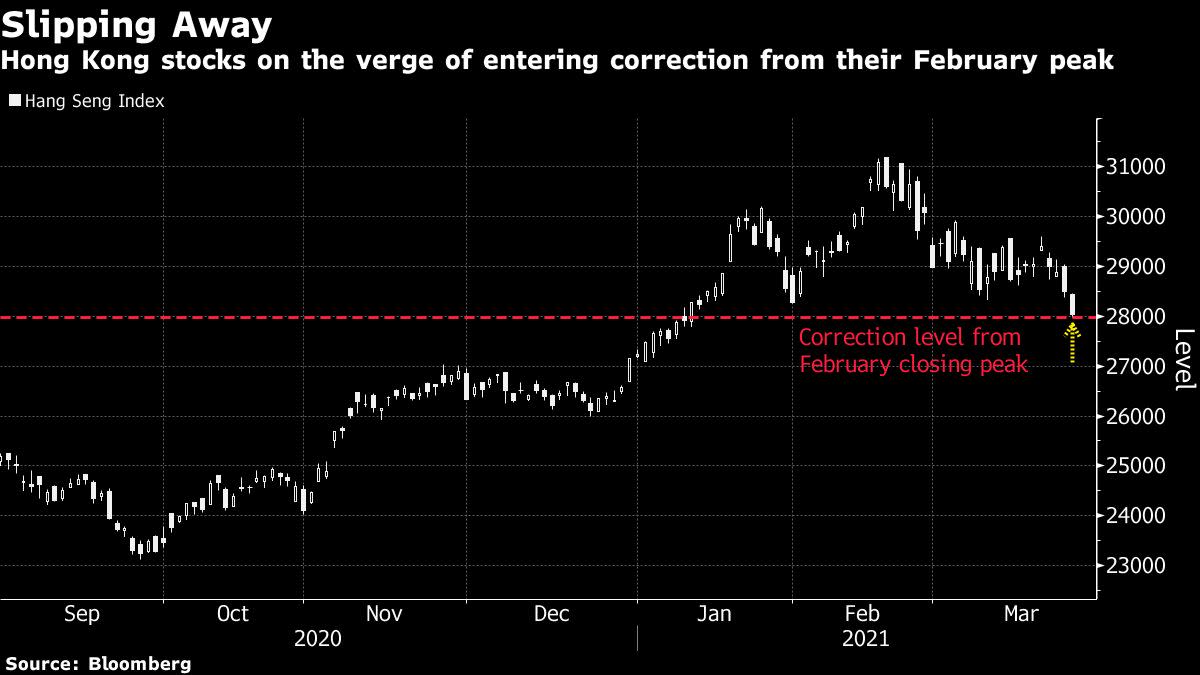Hang Seng Enters Correction as Vaccination Halt Worsens Selloff

(Bloomberg) — Hong Kong’s benchmark stock gauge slumped into a technical correction as the city’s temporary suspension of BioNtech vaccinations fueled worries over the pace of its recovery from the pandemic.
The Hang Seng Index lost 2% amid a broad selloff in Asia on Wednesday, capping a fourth day of losses and taking its decline from a Feb. 17 peak to 10%. Stocks in the commerce and industry sector as well as financials were the biggest losers on the gauge. All but three stocks on the measure fell.
The Hang Seng’s recent slide has come as traders rush to sell pricey stocks amid rising bond yields. As one of Asia’s largest and most open equity markets, Hong Kong is particularly sensitive to shifts in global liquidity. China’s CSI 300 Index entered a technical correction earlier this month on concerns over lofty valuations and potential liquidity tightening.
“The vaccination process will be slower than expected, resulting in a slower-than-expected recovery of the local economy,” said Steven Leung, executive director at at UOB Kay Hian (Hong Kong) Ltd. “Also, traders are still worrying about liquidity. Rising bond yields in the U.S. and limited measures by China’s central bank to boost liquidity remain as big overhangs to the market.”
Mainland investors offloaded a net HK$6.9 billion ($888 million) of Hong Kong stocks via the trading links with Shanghai and Shenzhen on Wednesday, a second day of selling and the biggest since March 9, according to data compiled by Bloomberg.
Hong Kong and Macau temporarily suspended Covid vaccines manufactured by BioNTech SE because of a packaging defect. That marks the latest setback for Hong Kong’s vaccine rollout, which has been slowed by public distrust in the Beijing-backed government.
READ: Hong Kong, Macau Suspend BioNTech Vaccines on Packaging Defect
Bearish Technicals
The HSI’s move on Wednesday formed a worrying signal to technical chart watchers as the index breached the neckline of a so-called bearish head-and-shoulders pattern, implying further downside.
“Falling below the neckline will lead to heavier selling pressure — some technical analysis believers may start dumping shares,” Castor Pang, head of research at Core Pacific-Yamaichi International Hong Kong Ltd., said earlier in the day. “If Hang Seng Index closed below 28,200 (points) today, I think it will try to test the low level seen in last November.”
Meanwhile, rising volatility is also starting to impact investor appetite for the Hong Kong’s IPOs and new listings that were in hot demand last year, with the days of the massive first-day pops likely nearing an end.
READ: IPO Mania Fizzles in Hong Kong as Mega First-Day Pops Fade
Earnings Focus
On the positive front, Internet gaming giant Tencent Holdings Ltd., which has the highest weighting on the HSI gauge, reported better-than-expected earnings after the close of markets.
Geely Automobile Holdings Ltd. was the biggest loser on the benchmark, falling 12% in a second day of declines, after China’s biggest maker of local, branded cars on Tuesday posted a worse-than-expected drop in 2020 earnings. Shares of Macau casino operators also dropped following the vaccination halt.
China’s CSI 300 Index lost 1.6% on Wednesday to close at its lowest level since Dec. 11.
“Hong Kong stocks are more swung by U.S. Treasuries and A-shares for now,” said Tracy Chan, an analyst at KGI Asia.
For more articles like this, please visit us at bloomberg.com
Subscribe now to stay ahead with the most trusted business news source.
©2021 Bloomberg L.P.




